 On June 5, 2019, Governor J.B. Pritzker enacted legislation that provides Illinois taxpayers an opportunity to comply with previous tax obligations. The legislation establishes an amnesty program for “any tax” imposed by the State of Illinois and collected by IDOR (with a few exceptions), including but not limited to unpaid corporate and individual Illinois income taxes, retailers’ occupation tax, use tax, employment tax, and franchise tax. It covers both unfiled (or incorrect) returns that need to be filed (or amended) and outstanding tax liabilities that need to be paid.
On June 5, 2019, Governor J.B. Pritzker enacted legislation that provides Illinois taxpayers an opportunity to comply with previous tax obligations. The legislation establishes an amnesty program for “any tax” imposed by the State of Illinois and collected by IDOR (with a few exceptions), including but not limited to unpaid corporate and individual Illinois income taxes, retailers’ occupation tax, use tax, employment tax, and franchise tax. It covers both unfiled (or incorrect) returns that need to be filed (or amended) and outstanding tax liabilities that need to be paid.
The new law creates two amnesty programs for taxpayers wishing to get back into compliance. The first program is available for unpaid taxes owed to the Illinois Department of Revenue (the “Department”) for any taxable period ending after June 30, 2011 and prior to July 1, 2018. 35 ILCS 745/10. It does not include taxes not collected by the Department such as property, estate, franchise and insurance taxes, and local taxes paid directly to the local government. This amnesty program is available only between October 1, 2019 and November 15, 2019 (the “Amnesty Program Period”). In return for full payment during the Amnesty Program Period of all outstanding tax liabilities of eligible taxes, the Department will abate and not seek to collect any interest or penalties on those liabilities, and it will not seek civil or criminal prosecution for any taxable period for which amnesty is granted. Amnesty is only available to taxpayers who are not a party to any criminal investigation, or any civil or criminal litigation pending in court for nonpayment, delinquency or fraud concerning any taxes owed to Illinois.
The second amnesty program is available for taxpayers owing franchise taxes or license fees imposed by the Illinois Business Corporation Act of 1983 for any tax period ending after March 15, 2008 and on or before June 30, 2019. 805 ILCS 8/5-10. Similar to the Department’s amnesty program, this program is available only between October 1, 2019 and November 15, 2019. Id. If a taxpayer pays all outstanding franchise taxes and license fees for any taxable period included in the program, the Illinois Secretary of State will abate and not seek to collect any interest or penalties, and it will not seek civil or criminal prosecution for the period for which such taxes and fees are paid. Id. Again, similar to the Department’s amnesty program, amnesty is not available to any taxpayer who is a party to any ongoing criminal investigation or any civil or criminal litigation pending in court for nonpayment, delinquency or fraud concerning franchise tax or license fees.
The recently enacted Department and Secretary of State amnesty programs offer qualifying taxpayers an opportunity to resolve past due liabilities without paying interest or penalties. Procedural guidance and proposed regulations have been issued providing more detail about the eligibility and qualifications for participation. A taxpayer that currently owes Illinois taxes should work with its tax adviser to determine if it should participate in the amnesty programs and, if so, to be ready to request amnesty and make full payment of the tax during the Amnesty Program Period of October 1, 2019 through November 15, 2019.
Attorneys at Gensburg Calandriello & Kanter, P.C. are available to answer questions and assist with amnesty submissions. If you believe you or your business has outstanding Illinois tax liabilities or unfiled returns and can benefit from this upcoming amnesty program, please do not hesitate to contact us for a more detailed analysis of your tax issues and potential amnesty benefit.
Matthew Chodosh
[email protected]

